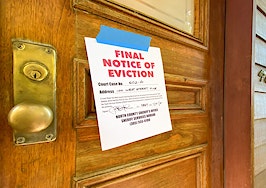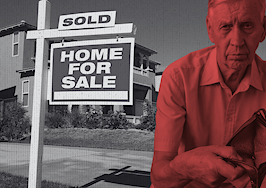Falling mortgage rates have fueled a mini-boom in refinancing while demand for purchase loans has slipped — potential ammunition for arguments that efforts to keep mortgage rates low could actually be hurting home sales.
Data from Black Knight’s July Originations Market Monitor report shows rate locks on rate-and-term refis were up 24 percent in July, with cash-out refinancing also up by 20 percent. Those increases meant refinancings accounted for 50 percent of all mortgage rate locks, the first time that’s happened in five months, Black Knight said.
But Black Knight’s data also showed rate locks on purchase loans fell 7 percent from June to July. Black Knight attributed the drop in the usual culprits, saying “rising home prices and constrained for-sale inventory continue to put downward pressure on purchase lending volumes.”
Falling mortgage rates can contribute to higher home prices, since lower rates mean lower monthly payments, allowing homebuyers to qualify for bigger mortgages. And when existing homeowners are able to refinance at a lower rate, that might discourage them from putting their homes on the market when rates go back up, since they’d have to take out a mortgage at a higher rate if they bought another house.
In an analysis published in June, First American Financial Corp. Chief Economist Mark Fleming explored the concept of “homebodies” — homeowners who don’t want to give up their rock-bottom mortgage rates, and seniors who choose to age in place.
Homeownership duration — the average length of time someone lives in their home — rose to record-high 10.6 years in May, Fleming noted at the time.

Mark Fleming | Photo credit: First American
“Two trends are locking homebodies in place and driving the increase in tenure length,” Fleming wrote. “First, for homeowners with rock-bottom rates, modestly higher rates in an historically low inventory environment may disincentivize some from selling their homes, thus preventing more supply from reaching the market. Second, seniors are choosing to age in place.”
Now, Fleming tells Inman that while listing shortages and low interest rates are both contributing to rising home prices, supply shortages are the bigger issue.
“While rates are likely to rise soon, the shortage of supply will take much longer to resolve,” Fleming said in an email. “In part because rising rates cause existing homeowners, the largest single source of supply, to be financially ‘locked in’ to their existing home.”
Lawrence Yun, chief economist for the National Association of Realtors, said interest rates have had a bigger immediate impact than listing shortages, because “record-low interest rates were unexpected, as well as the record fast home price appreciation.”

Lawrence Yun | Photo credit: NAR
Yun said in an email to Inman that it’s not clear if rising rates would lead to further increases in homeownership duration. NAR reported last year that median tenure increased by 3 years from 2008 to 2018, to 13 years. The outlook going forward is less clear, Yun said, “because of the new pandemic and post-pandemic economy of working from home and farther away from job centers.”
Fleming agreed that not all would-be sellers will feel locked into their home, just because they have a low mortgage rate.
“Luckily though, we are not purely rational financial decision makers,” Fleming said. “There are many reasons for moving, so the impact of rising rates won’t completely stop people from making the choice to sell.”

Scott Happ
Scott Happ, Black Knight’s president of Secondary Marketing Technologies, said the repeal of a 50-basis-point refinancing fee formerly charged by Fannie Mae and Freddie Mac helped push interest rates below 3 percent.
A surge in refinancing rate locks in mid-July “was pronounced, but short-lived, suggesting that crossing the 3 percent threshold was what borrowers were waiting for before acting,” Happ said in a statement. “When rates ticked back above that psychological line, they held back on the sidelines once again. Now that rates are again below 3 percent, a very early look at August lock data suggests more of the same in the month’s earliest days.”
Average credit scores were up on July refi rate locks, which Black Knight said reflects the tendency for higher-credit borrowers to “react more quickly and strongly to refinance opportunities.” Average credit scores for rate-and-term refis jumped 5 points, to 736, but that’s down from 754 a year ago.
After climbing for the first three months of the year above the psychologically important 3 percent level, rates on 30-year fixed-rate loans have been steadily declining. So have rates on 15-year fixed-rate loans, which are popular with homeowners who are refinancing. By the end of July, rates on 15-year mortgages hit a record low of 2.10 percent in Fannie Mae records dating to 1991.
During the pandemic, the Federal Reserve has been keeping interest rates low by increasing its holdings of long-term Treasurys and mortgage-backed securities (MBS) by $120 billion a month. By keeping rates low, the Fed hoped to stimulate borrowing — and spending — and keep the economy from crashing.
Although many say the strategy has worked, there’s growing speculation about when the Fed might taper its debt purchases to head off runaway inflation. After their last meeting, Fed officials provided no hint of when they might taper, although many economists expect the Fed to at least set a timetable this fall.
As the balance sheet of the Fed’s debt purchases approaches $8 trillion, St. Louis Fed President James Bullard is on the record as being somewhat skeptical about the benefits of the Fed continuing to buy mortgages to keep rates down.
Asked whether he’d be inclined to taper purchases of mortgages or Treasurys first, Bullard told CNBC in June that he’s “leaning a little bit toward the idea that maybe we don’t need to be in mortgage-backed securities with a booming housing market and even a threatening housing bubble here, according to some people.”












